 Venus Transit 6.5.12 photo by Mark Mathosian The three transit viewing glasses I had purchased at COSI science museum nestled in my purse all evening. Despite a cloudy forecast, I remained hopeful: Weather conditions can change here every hour. But they didn’t. Gray skies and sprinklings of rain moved in during the morning and camped out all day.
Venus Transit 6.5.12 photo by Mark Mathosian The three transit viewing glasses I had purchased at COSI science museum nestled in my purse all evening. Despite a cloudy forecast, I remained hopeful: Weather conditions can change here every hour. But they didn’t. Gray skies and sprinklings of rain moved in during the morning and camped out all day.
I took the glasses to Sabbath House meeting…a group that has met monthly for years to share food, conversation, and prayer. I knew my friends would be happy to take a look at the Venus Transit after dinner, or whenever the sun broke through. Which it didn’t.
Mid-evening, I took a few moments to walk around the yard and driveway, hoping to see a patch of clear sky, but settled for knowing that something wonderful was happening beyond the clouds despite circumstances that made a first hand experience impossible. I closed my eyes and imagined gazing past Venus to the sun. Because we cannot see something with our own eyes does not mean it does not exist.
That is one bit of perspective. Like Job, I am humbled, an infinitesimal part of the expanding universe. Unfolding every moment. Full of planets and stars. And lots and lots of dark space. Of possibilities. And then there is the universe of family and friends, the universe of my street, my workplace, the grocery store where I shop. I cannot imagine what is going on in the many places and hearts that fill this tiny corner of the world.
Back from the driveway into the warm embrace of Sabbath House. And friends. Companions on the way. Dinner, as always was nourishingly delicious from wine and bread to homemade cardamon coffee cake for dessert. At least as vital was the conversation: Movies to see, the Vatican and LCRW, a letter of support from the president of a prominent Catholic foundation sent to sisters worldwide, including the ones at whose table we gathered.
Laughter. Holding a heart struggling with pain and anger and tears. I love this little part of the universe and thank God for it.
I pulled back sheer curtains all evening, hoping to find a crack in the cloud canopy. No. This is Ohio, after all. But Venus was crossing the face of the sun, as it does so many times a year. But this time, this century, we were invited to watch. Seeing a planet silhouetted against the sun is eerily like viewing a classroom model of the solar system without wires, without dust, that suddenly exploded into the real thing and I am floating in space gazing from in the midst of it.
Or not. It was happening, though. Sometimes you don’t have to see to believe.
In our little space, we sat around the living room, graced with a flame dancing on the oil lamp’s clay ball. Like earth. Like a planet resting. All aflame with Presence. The oil lamp sat on a square Sardinian place mat. A gift from a daughter. I wondered if she would see the transit in Denmark where she was at the moment.
We prayed, reflecting on imagination and the encouragement we give and receive when our lives hit a “blank wall.” Then we asked for a blessing. Max gave us each a copy of her new book, “Silver Linings: Blessings for Shadow Times”. We chose a blessing that spoke to our need. It was read by the person to our right.
“May God be present to you whenever you are angry, energizing you to discover divine truths wherever they may be found…May the God who holds you in your anger, the God of Patience, bless you.” Amen. Amen.
“…May you recognize in God’s unconditional love for you that there is already a place for you, assigned at your creation which only you can fill and only your gifts can bring to fullness…May the God of Stillness bless you.” Amen. Amen.
“May the God of Courage bless you.” “May you be found by God when your path is obscured by the ashes of your life. When the contentment of the present is disturbed by the failures of the past…May the God of New Fire bless you.” “May your embrace of God’s dream once again fire the passion that is in you. May the God of Encouragement bless you.”
Amen. Amen.
We left by the front door, entranced by four young robins packed into the small nest cemented to the grapevine wreath hanging above the mailbox, claiming the address written in black on the yellow siding. Their mother watched nervously from a nearby tree.
“It’s the second family.” Max shared photos of the first gathered in a small album.
“We thought about putting that yellow tape around the porch, posting a sign: Maternity Ward.”
Covered with Blessing, I waved goodbye, the last to leave, and flicked the car’s interior lights to the one standing in the doorway seeing me off.
I checked my phone. A text from a daughter ” I just saw the transit, hanging out with my NASA friend…”
Driving home I kept glancing at the sky. Clouds were beginning to separate. A bit of sunset peeking through.
Perspective. Question. Who is this great God who keeps us all, planets and birds, daughters and friends, and all I cannot imagine, in her hands? Who is this God who dances like flame on the clay ball and in my heart? Who is this God who blesses? Who is With, cloudy or not?
Like the Venus transit, I don’t have to see to know…
And the viewing glasses? They wait in a drawer for the next celestial event that requires looking at the sun!
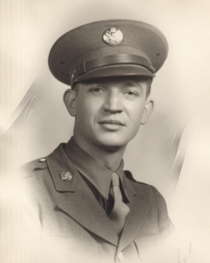
 Operation Chowhound/Manna Delft Commemorative Tile Bud, wearing his veteran’s hat, spoke to the staff on Memorial Day, as he always does. He reminded us of the sacrifices made by men and women in uniform. I listened with a heart still grieving the loss of my father. The first Memorial Day since his death. The first time in a long while that my siblings and I didn’t visit him and thank him for his service.
Operation Chowhound/Manna Delft Commemorative Tile Bud, wearing his veteran’s hat, spoke to the staff on Memorial Day, as he always does. He reminded us of the sacrifices made by men and women in uniform. I listened with a heart still grieving the loss of my father. The first Memorial Day since his death. The first time in a long while that my siblings and I didn’t visit him and thank him for his service. 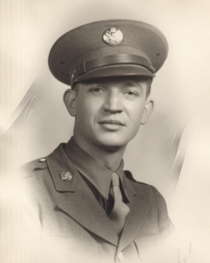 Dad served in the United States Eighth Army Air Force, 490th Bomb Group (H) as an intelligence officer and asked if he might go on one of the Chowhound flights. His Dutch father was one of sixteen children and Dad had lots of aunts, uncles, and cousins in Holland. He watched as boxes fell and people on the ground gratefully waved their thanks.
Dad served in the United States Eighth Army Air Force, 490th Bomb Group (H) as an intelligence officer and asked if he might go on one of the Chowhound flights. His Dutch father was one of sixteen children and Dad had lots of aunts, uncles, and cousins in Holland. He watched as boxes fell and people on the ground gratefully waved their thanks. 
 On this feast of the Ascension, I offer the reflections of two Catholic’s on the subject, one a theologian and the other a specialist in the fields of spirituality and systematic theology. The first is Karl Rahner, a German Jesuit whose contributions including those at Vatican II have made him one of the most influential theologians of the twentieth century. In the book
On this feast of the Ascension, I offer the reflections of two Catholic’s on the subject, one a theologian and the other a specialist in the fields of spirituality and systematic theology. The first is Karl Rahner, a German Jesuit whose contributions including those at Vatican II have made him one of the most influential theologians of the twentieth century. In the book 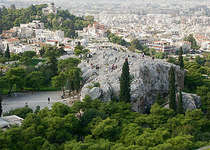
 PHOTO: Mary van Balen But now ask the beasts to teach you,/ the birds of the air to tell you;/Or speak to the earth to instruct you,/ and the fish of the sea to inform you./Which of these does not know/that the hand of God has done this? Job 12. 7-9 from Morning Prayer
PHOTO: Mary van Balen But now ask the beasts to teach you,/ the birds of the air to tell you;/Or speak to the earth to instruct you,/ and the fish of the sea to inform you./Which of these does not know/that the hand of God has done this? Job 12. 7-9 from Morning Prayer Then Paul stood up at the Areopagus and said: “You Athenians, I see that in every respect you are very religious. For as I walked around looking carefully at your shrines I even discovered an altar inscribed “To an Unknown God.” What therefore you unknowingly worship, I proclaim to you. The God who made the world and all that is in it, the Lord of heaven and earth, does not dwell in the sanctuaries made by human hands, nor is God served by human hands because God needs anything. Rather it is God who gives everyone life and breath and everything…though indeed God is not far from any of us. For ‘In him we live and move and have our being.’ Acts 17.22-25, 27b-28
Then Paul stood up at the Areopagus and said: “You Athenians, I see that in every respect you are very religious. For as I walked around looking carefully at your shrines I even discovered an altar inscribed “To an Unknown God.” What therefore you unknowingly worship, I proclaim to you. The God who made the world and all that is in it, the Lord of heaven and earth, does not dwell in the sanctuaries made by human hands, nor is God served by human hands because God needs anything. Rather it is God who gives everyone life and breath and everything…though indeed God is not far from any of us. For ‘In him we live and move and have our being.’ Acts 17.22-25, 27b-28 PHOTO: Mary van Balen The homily at Mass yesterday included a reference to the pelican and the stained glass window depicting a pelican feeding her young. I first encountered this image in an old university building housing the school of theology. Intrigued by the old ceramic tile with the image of a pelican and her young, I made a rubbing of it in my journal and later asked about it.
PHOTO: Mary van Balen The homily at Mass yesterday included a reference to the pelican and the stained glass window depicting a pelican feeding her young. I first encountered this image in an old university building housing the school of theology. Intrigued by the old ceramic tile with the image of a pelican and her young, I made a rubbing of it in my journal and later asked about it.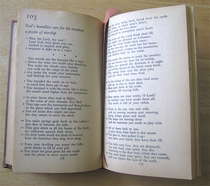
 PHOTO: Mary van Balen from Volume 4
PHOTO: Mary van Balen from Volume 4 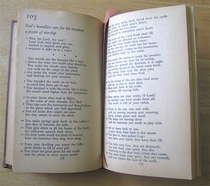 As I prayed the Psalter I thought of St. Athanasius (2295-373CE) whose feast was May 2. He is known for his fight against the heresy of Arianism that claimed Jesus was in no way equal to God the Father, having been created, but what I most remember about Athanasius is his wonderful letter to Marcellinus that spoke eloquently of the interpretation of the Psalms. While other books of the Bible are filled with words that inspire or instruct, yet remain the words of the author, words of the psalms are like one’s own words that one read; and anyone who hears them is moved at heart, as though they voiced for him his deepest thoughts.
As I prayed the Psalter I thought of St. Athanasius (2295-373CE) whose feast was May 2. He is known for his fight against the heresy of Arianism that claimed Jesus was in no way equal to God the Father, having been created, but what I most remember about Athanasius is his wonderful letter to Marcellinus that spoke eloquently of the interpretation of the Psalms. While other books of the Bible are filled with words that inspire or instruct, yet remain the words of the author, words of the psalms are like one’s own words that one read; and anyone who hears them is moved at heart, as though they voiced for him his deepest thoughts. When I hold the old Psalter in my hands and pray the words printed there, I am connected not only with my monk friends, but also with my ancestors. I am in touch with my heart, and my journey and the God who embraces us all.
When I hold the old Psalter in my hands and pray the words printed there, I am connected not only with my monk friends, but also with my ancestors. I am in touch with my heart, and my journey and the God who embraces us all. Supermoon, May 5, 2012 I wish I had a photo of the campfire, of someone holding up jumbo marshmallows flaming on the end of a stick looking like a torch, or another women eating the gooey treats like a drumstick. Or a photo of a woman sitting by the pond casting and catching fish into the night. Or of the supermoon edging the dark rain clouds with silver and then emerging glorious and bright.
Supermoon, May 5, 2012 I wish I had a photo of the campfire, of someone holding up jumbo marshmallows flaming on the end of a stick looking like a torch, or another women eating the gooey treats like a drumstick. Or a photo of a woman sitting by the pond casting and catching fish into the night. Or of the supermoon edging the dark rain clouds with silver and then emerging glorious and bright.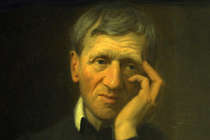

 Could it be that the faithful might have a theological intuition that diverges from the Churchs teaching and that they might be right? It wouldnt be the first time. Blessed John Henry Newman thought so. He had studied the history of the Arians and used some of that history in his article, On Consulting the Faithful on Matters of Doctrine. Newman pointed out that the Arian heresy was defeated not by bishops or popes, most of whom supported the Arian position. The faithful, mostly the laity, were the ones who steadfastly held to the truth of the divinity of Jesus, sometimes at the cost of their lives. It was the consensus fidelium or consent of the faithful that saved the day.
Could it be that the faithful might have a theological intuition that diverges from the Churchs teaching and that they might be right? It wouldnt be the first time. Blessed John Henry Newman thought so. He had studied the history of the Arians and used some of that history in his article, On Consulting the Faithful on Matters of Doctrine. Newman pointed out that the Arian heresy was defeated not by bishops or popes, most of whom supported the Arian position. The faithful, mostly the laity, were the ones who steadfastly held to the truth of the divinity of Jesus, sometimes at the cost of their lives. It was the consensus fidelium or consent of the faithful that saved the day.
 PHOTO: Mary van Balen One day last week and friend and I were walking through a small woods near my home.
PHOTO: Mary van Balen One day last week and friend and I were walking through a small woods near my home.